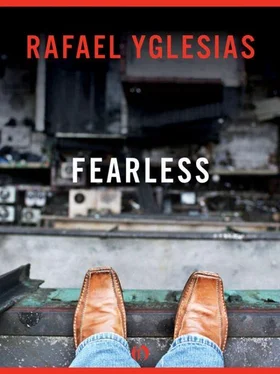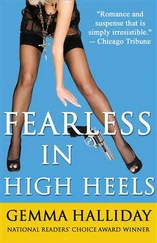But not because of a silent killer in her brain. Not of some cancer eating away at her, dissolving her into bone and dead skin, like her poor papa.
“What could it be?” she asked Brillstein.
“I don’t know,” Brillstein stood up and turned partly toward Manny. “But if you can’t remember anything—”
“I can remember!” Carla said, desperate to be released from the lawyer’s death sentence.
“What!” Manny said.
“Of course you can,” the lawyer nodded without surprise. “I’ll be right back.” He walked out to the hall.
He tricked you .
“Are you playing games, Carla?” Manny asked, so angry he was squinting, his eyes wanting to squeeze the truth out of her.
“I remember it happening,” she said nervously.
The lawyer was back. “Here’s the tape recorder. If you want me to be your lawyer—”
“You’re our lawyer,” Manny said, his voice deep and furious.
“Great,” Brillstein said without excitement. He put a red tape recorder on the glass table. “Tape’s loaded. Just press Play and that hole right there is a microphone. You don’t have to get that close to it, just talk in a normal tone, and say what you can remember. That’s all I need. And if it turns out you don’t feel like giving a deposition, we can talk about that. What you remember for me and what you remember for the world, who knows? Maybe they’re not the same thing. It’s not their right to know everything. You haven’t committed a crime. You didn’t crash that plane. You’re a victim. I’m your lawyer, whatever you say to me is in confidence. You know what that means. No one else has to know.”
“I don’t remember very much,” Carla sulked. “That’s all I meant.”
“And anything you remember and say on that tape is for me and me alone.” The lawyer pointed at Manny. “Even your husband shouldn’t hear it.” He smiled widely at Manny, but only for a second.
“Why not?” Manny asked, frowning. “You said before she could tell me and I could tell the tape.”
“I did?” Brillstein was astonished. He stared at the glass table as if it were a mirror and he could check if the image reflected was his own. “Well, forget that. I was totally in error.” The lawyer looked up and said sternly at Carla, “For legal reasons you have to promise me that just you and I will know what you say on the tape. At least for now.” He stood waiting for an answer, folding his small hands at his groin, an attentive pupil.
This time she knew he was lying. There were no legal reasons. He wanted to fool her into feeling safe about talking. Carla nodded.
Brillstein turned to Manny. “I mean it. It’s important that you not hear it.”
Manny shrugged. “You’re the boss.”
“So—” the lawyer almost sang the word, releasing a puff of air and clapping his hands softly. “We’re settled?
Manny nodded gravely. “Yes, sir,” he said.
The two men walked together into the hall. Manny whispered something. Brillstein answered in a normal tone. Carla didn’t bother to eavesdrop. She stared at the tape recorder. Its plastic cover looked cheap. The red paint was laid on so thinly you could almost see through to the transistors inside. But Brillstein was nice and respectable, dressed in a beige suit and a tie. She knew he couldn’t be trusted but she didn’t feel he was dangerous to her.
“I’ll help you get back to the bedroom,” Manny said when he returned alone. He nodded at the tape recorder. “Or you can talk to it here.”
“Not now,” Carla moaned. A reflex. She should have said nothing; pretended to agree.
“Honey,” Manny whined. He twisted his body, wriggling with irritation. “It’s just so Mr. Brillstein can get started. He’s the only one’s gonna hear it. It’s like talking to a priest.”
Talking to Father Conti after the funeral: he had bowed his head and covered her hand with his soft doughy palms, mumbled something about pain, and said, “You know, He also lost a son.”
“But I’m not God,” Carla had answered and then cried so hard she couldn’t hear what else the priest said.
She hadn’t answered Manny and he stamped his foot, not very hard, but hard enough to make the glass coffee table vibrate. “Listen to me, Carla! If you don’t tell him what he needs to know then he can’t do his job!”
“Manny…” She meant to shout back at him, but her voice was weak and trembling. “Just—” she lost her breath she was so upset. “Just—” she sighed to let out the nervous air and take in something calmer to keep her going. “Just let me rest a little. You go out. I need you to go out.”
“I gotta go back to work anyway. It’s the middle of the day. I’m gonna get fired the way I’m fucking up.” He moved to go and then hesitated. “You need anything? I’ll tell your mother on my way out.”
“Tell her to leave me alone for a while.”
Manny nodded solemnly. He kissed her on the forehead. His lips were wet.
Their moist impression dried slowly and coldly in the air-conditioned room. She kept a close watch on the orderliness around her, as if it might spontaneously change.
Her mother came in to ask if Carla wanted something to eat or drink. Manny must have told her about the meeting with the lawyer on his way out because she glanced at the tape recorder immediately and yet didn’t ask about it. Carla told her she didn’t want anything and sent her away. Again, she studied the dead room.
She remembered a newborn Bubble by the window, being shown off to all the relatives, wrapped in a blanket and half-buried in a big clumsy carriage.
She remembered carrying him in for middle-of-night feedings so he wouldn’t disturb Manny. Not often. Only when Bubble was restless. In the bedroom his crying could pierce through the door, cross the hall, and wail in their room. Besides there was nothing as comfortable as the couch.
She had held her baby so close: hot and wriggling against her in the quiet apartment. His hunger pulled at her breast. The drapes were tinted amber by the streetlights and only an occasional drunken song or mysterious explosion would startle Bubble. They were so alone and so safe.
She didn’t cry at the vivid memory.
She couldn’t tell the truth but she could tell them what they needed. She pressed the Play button and talked.
Max answered the television reporter’s question, asked by Ellen Kaku, the same Japanese-American woman who had blocked his way home the day before, while something that had bothered him all night, percolating underneath his duties as a survivor, continued to worry him. He talked into the microphone without energy: “I didn’t have time to think. I just got Byron here,” he gestured down to the eager dirty blond head of hair leaning against his arm, “out of his seat—”
“I was upside down!” Byron interrupted with enthusiasm.
“Were you stuck?” Kaku moved the mike from Max’s mouth down to the little boy’s level.
“I had the seat belt on! It was stuck!”
“So you did save his life?” Kaku demanded of Max with a stern look and sharp tone. She had obviously decided he could not be trusted to tell all.
It was at that moment, standing on the corner of Eighty-fourth and West End, surrounded by two interrogating television crews and a crowd of eavesdropping neighbors, that Max realized what had bothered him all through the sleepless night, his first night home after the crash.
“Is that right, Mr. Klein?” another reporter called out. “You saved both this little boy’s life and also the baby’s?”
Max heard the question. He did not answer because the implication of Jeff’s scam with the tickets had finished brewing in his head. When their presentation to Nutty Nick was postponed a week Jeff had switched the plans so they would arrive on the day of the appointment. He said he was being considerate of Nan, that it shortened how long she would be stuck with their two kids. The truth was: Jeff had picked that flight because he had gotten a deal on it. They were traveling to a meeting that over the course of a few years could be worth a million dollars in fees and Jeff had arranged that they would arrive with only two hours to spare for the sake of a couple hundred bucks.
Читать дальше












